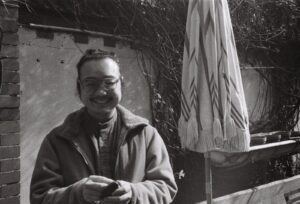Second Cohort

Anne Bertram
- E-Mail: anne.bertram@fau.de
Anne holds a BA in British Studies as well as a BA and MA in American Studies from the University of Leipzig. During her studies she received funding from the Studienstiftung des Deutschen Volkes, worked as an instructor and research assistant at the Institute for American Studies in Leipzig, and as a social media manager for the German-American Institute Saxony. Her research interests are located in the realm of popular culture and film studies, predominantly centering on displays of femininity and contemporary renditions of regional Gothic.
Project: Imaginings of White Femininity in Contemporary Iterations of Sentimental Southern Gothic Visual Culture (WT)
Recent years have seen an increase and revival of a Southern Gothic aesthetic on social media platforms and in US film. At the core of this visual culture is the commodified staging of untouched nature, abandoned buildings, Christian symbolism, and young white women. In my dissertation project, I explore how this aesthetic is permeated by the sentimental and which dominant myths about US-American society are reproduced and worked through in these cultural products. My aim is to develop the concept of a ‘sentimental Southern Gothic’ which is centered around the therein contained narratives and imaginings of white femininity. On a theoretical level, the intricacies and the tying together of research on the sentimental as well as the Gothic mode is decisive and further intertwined with perspectives from regionalism, affect, hauntology and nostalgia studies. The cultural work of the ’sentimental Southern Gothic‘ is then to be captured and decoded through a discourse analysis of social media content and film. By uncovering how products of this specific visual culture construct and promote an image of a supposedly apolitical and ahistorical US South, my dissertation project seeks to make a critical contribution to existing understandings of the sentimental as an aesthetic narrative strategy.

Isabelle Brandis studied English and American Studies as well as Scandinavian Studies at Friedrich-Alexander-Universität Erlangen-Nürnberg. She holds a master’s degree in North American Studies: Culture and Literature. Due to her vast interest in languages, she acquired basic knowledge of Spanish and Korean through language courses and self-study, and is furthermore fluent in English, Swedish and Danish. Her research interests focus on representations of race, class, gender and sexuality in popular culture and literature.
Project: Unraveling the Sentimental: Girlhood, Home, and Family Bonds in Louisa May Alcott’s Little Women, Lucy Maud Mongomery’s Anne of Green Gables and Their Screen Adaptations
Children have always been at the center of sentimental discourse as almost nothing is more deeply rooted in sentimentalization than the depiction of a child and the process of coming-of-age. Childhoods and the relationships to family and kin provide a broad playing field for sentimental discourse and are often expressed in a sentimental code that can be well analyzed in literary texts and media representation. Anne of Green Gables (1908) by Lucy Maud Montgomery and Little Women (1868/69) by Louisa May Alcott are among the most beloved North American (children’s) classics, which still enjoy great popularity internationally since their publication, not least also thanks to their well-known adaptations. In my PhD project I will thus examine the complex portrayals of affective intensity as part of the Little Women and Anne of Green Gables narratives and consider changes in the characters’ identity constructions and interpersonal relationships throughout their various adaptational interpretations over the years. Further attention will be paid to the adoption or rejection of the narratives’ historically sentimentalized notions of marriage and female domesticity with a special focus on the significance that is ascribed to the concepts of family, the creation of kinship and community within the construction of home and a place of belonging. The planned research aims to demonstrate the nuances within the sentimental representations of nineteenth-century girlhood and familial bonds in a comparative juxtaposition of the original texts and their selected adaptations.
Zeyu Du
- E-Mail: zeyu.du@fau.de

Zeyu Du holds a bachelor’s degree in history from Sichuan University and a master’s degree in Modern Chinese History from Renmin University of China. Before joining the Research Training Group at FAU Erlangen-Nürnberg, he spent one year as a doctoral student in the university’s Sinology Department. His research interests include modern Chinese intellectual history, Chinese diaspora studies, and Hong Kong history.
A Sentimental History of Chinese Exiled Intellectuals During the Cold War, 1949-1989
The year 1949 witnessed the largest wave of intellectuals choosing exile in modern Chinese history following the establishment of the communist regime. This project undertakes a sentimental history of this diasporic group. Despite their dispersion across Hong Kong, Taiwan, and the United States, this study investigates how they formed a cohesive “emotional community,” forged through transnational networks of correspondence, shared periodicals, and the circulation of key individuals. The central aim is to analyze this community’s “structure of feelings,” exploring how sentiments such as nostalgia, patriotic worry, grief, and hope were shaped by their experiences of displacement, historical trauma, and the geopolitical order of the Cold War. Drawing on theoretical frameworks from the history of emotions (Rosenwein), cultural studies (Williams), and modern Chinese literary studies (Wang, Lee), this study positions sentimentality as its core analytical dimension, responding to a tendency in previous scholarship on Chinese exiles to prioritize political or philosophical thought while neglecting this critical aspect. Employing a focused case-study approach on three key intellectual circles, this research traces the shared sentiments that animated their transnational network. By doing so, it aims to uncover new dimensions for understanding the Chinese exiles and to contribute a new perspective to the intersection of Chinese studies, diaspora studies, and sentimental studies.
Sandra holds a Master’s degree in Sociology from Friedrich Alexander University Erlangen-Nuremberg. After graduating, she engaged in ethnographic research projects centred on the subject of digitalisation. Her research is driven by the question of why we believe what we believe and how social reality is created. Since April 2025, she has been doing her doctorate as part of the DFG Research Training Group “The Sentimental in Literature, Culture and Politics”.
Project: The Influence of Sentimental Narratives on Collective Identity Formation in Spiritual Volunteering
The research project investigates how emotionalized narratives and sentimentally framed experiences contribute to the creation of belonging and identity in the context of spiritual volunteering. The focus is on the question of how longing, nostalgia and affective connectedness are staged, experienced and negotiated in ritualized practices and communal communication. Spiritual volunteering – for example in yoga retreats or ashrams – offers an exemplary experiential space in which romanticized notions of closeness to nature, inner authenticity and transcendent community are cultivated. The project pursues a sociology of knowledge and symbolic-interactionist approach in order to analyze the performative power of feelings and sentimentality in these social processes. Through ethnographic fieldwork and the evaluation of affectively charged interactions, the aim is to show how emotional experiences are collectively interpreted, shared and condensed into an element of identity-forming community. The focus is particularly on the social practices and narratives through which spirituality is experienced and embodied as a perceived truth.

Vanessa received her BA in English Literature with a minor in Communication Studies from the
University of Nevada, Reno and her MA in English Studies from Friedrich-Alexander-Universität
Erlangen-Nürnberg. Her research interests include Romantic and Victorian literature, gothic and
horror studies, gender studies, popular media and culture, narratology and genre theory.
Project: Heartache Horror: Home, Family, and Generational Trauma in the Sentimental Horror of
Mike Flanagan’s Television Series
This project focuses on modern popular horror which explores personal and cultural generational trauma through the use of the home and family as a site of both sentimentality and horror. Drawing on the tropes and traditions of Gothic literature, much of contemporary horror explores the haunting nature of the past through its lingering griefs, traumas, and injustices, which, failing to have been properly confronted and rectified, continue to antagonize the present. This project will explore the combination of horror and sentimentality and how it creates a space for richly textured stories which explore the emotional depths of both the personal and cultural traumas of a given society. A cultural reading of popular modern horror, such as thetelevision works of director Mike Flanagan (The Haunting of Hill House, The Haunting of Bly Manor, Midnight Mass, The Midnight Club, and The Fall of the House of Usher) aims to question how sentimentality operates as a mode of storytelling within horror, as well as contribute to the discussion of how sentimentality may exist as horror as well.

Jacob Hovde
- E-Mail: jacob.hovde@fau.de
Project: Bridging the Sentimental Gap: Climate Change Cinema and Attuning to Hyperobjects
Following decades of climate change communication, the information deficit – once identified as the primary roadblock to collective awareness and subsequent action – has largely been addressed. Yet, green initiatives are losing the momentum that reactionary political movements, which ignore or actively reverse climate mitigation efforts, are simultaneously gaining. This dynamic coincides with and is fueled by a public sentiment displaying growing levels of inertia towards the crisis. Unsurprisingly so, when considering research from environmental humanities suggesting that hard data lacks the cultural response to adequately embed its information. Especially when this data is introduced into an environmental ontology informed by Cartesian dualist notions of the human as an entity distinct from a culturally constructed notion of ‘nature.’ This dissertation argues that sentimental forms of cinema can elicit emotional responses that align with the spatiotemporal and affective dimensions of hyperobjects, fostering deeper audience engagement with the complexities of global warming. It aims to contribute to efforts seeking to address the „crisis of imagination“ identified by Amitav Ghosh and elaborated by Dipesh Chakrabarty and Bruno Latour. Drawing from Morton’s concept of hyperobjects, as well as the growing research on the affective dimensions of visual representations, the study seeks to identify sentimental aesthetic strategies that enable audiences to emotionally connect with the hyperobject of climate change. Close readings of selected cinematic texts will be employed to infer a grammar of environmental sentimentality – a set of aesthetic and narrative guidelines informing emotionally resonant environmental representations that weaken the felt disconnection from the phenomenon and, in the long term, inspire meaningful action in the face of the climate crisis.

Charlotte holds a BA in Political Science as well as a MA in Sociology from Ludwig-Maximilians-Universität Munich. Before joining the Research Training Group at FAU she worked as a research associate at SHARE (Survey of Health, Ageing and Retirement in Europe), where she applied qualitative methodology to improvement questionnaire design. Her research interest include gender studies, care (work), and theories of social inequality.
Project: „Warm-hearted compassionate care – tailored to your family’s needs“ – Sentimental Framings in the Provision of Live-In Care
This research project examines the symbolic and emotional framings of paid care work in the context of transnational live-in care arrangements. Focusing on the websites of commercial placement agencies, the project investigates how these actors construct, market, and legitimize care services through sentimental codes, such as “loving support,” “dedication,” or “warm-hearted assistance”, that emotionally charge and morally elevate a highly precarious field of labour.
While research on live-in care has emphasised issues of migration, inequality, and labour precarity, this project addresses the symbolic dimension of how care work is represented and commodified. To do so it employs the concept of sentimentality as a socially structured communicative code that shapes how emotions are expressed, read, and regulated in public discourse.
Using Grounded Theory Methodology, the analysis traces the sentimental narratives, visual strategies, and semantic patterns through which agencies present care as both intimate and professional, familial yet marketable. The project explores how narratives of emotional proximity, moral worth, and idealised family relations are mobilised to stabilise and naturalise market-based care arrangements. It further examines how these sentimental framings contribute to the depoliticization of precarious labour arrangements and the consolidation of gendered, class-based, and migration-related structural inequalities in the care sector.

Ege A. Özbek
- E-Mail: ege.oezbek@fau.de
Ege A. Özbek holds a double master’s degree in English and American Studies from University of Graz and Université Paris Cité. He earned his BA in American Culture and Literature with a minor in Art History from Hacettepe University. His master’s thesis focused on contemporary American eco-documentary. His research interests include visual culture, film studies, photography, intermediality, and sentimentality.
Project: The Manifestations of the Sentimental in Contemporary Political Documentary
This project explores sentimentality as both an aesthetic mode and a communicative code in contemporary political documentaries. It investigates how political emotions are mobilized to forge collective identification and inspire political engagement, through what Rebecca Wanzo terms “sentimental political storytelling” to articulate resistance and build affective agency. This study develops a theoretical framework around emotional truth, generated by aesthetic and narrative strategies, to analyze how these films mediate epistemic knowledge into doxastic common sense, thereby translating data and evidence into authentic, urgent experience. The initial selection of documentaries includes Powerlands (2022), Union (2024), and No Other Land (2024). This project analyzes these films not as isolated texts but as part of a social change process that, as Angela Aguayo argues, begins before a film is made and lingers long after. Blending “on-screen” cinematic artistry with “off-screen” participatory integrity, these documentaries challenge dominant media narratives and address the systemic injustices of neoliberalism, environmental racism, and colonialism. The central question guiding this study is: What are the manifestations of the sentimental mode as aesthetics and sentimental code as discourse, and how do they function to create this emotional truth?

Yuling Shi
- E-Mail: yuling.shi@fau.de
Yuling Shi received her Bachelor’s degree in Chinese Language and Literature, with a minor in English Language and Literature, in China. After working as an English teacher for three years, she moved to Germany for further studies. She completed her master degree in English and American Studies at the University of Bamberg. Her research interests include Chinese literature, martial arts fiction and popular culture, memory studies, and narratology.
Project: Knightly Bones, Tender Heart: The Sentimental in Chinese Knight-Errant
As a long celebrated literal and cultural symbol, the Chinese knight-errant has captivated the hearts and minds of generations of Chinese people transcending the limitations of time, space and ideologies. What intrinsic qualities have established the knight-errant as one of the most beloved icons in Chinese culture? What does the popularity of the knight-errant reveal about the evolution of Chinese cultural identity? My project seeks to answer these questions by proposing that Chinese knight-errant is, at its core, a sentimental subject—an autonomous moral agent unbound by external authorities or principles. Moreover, the shifting sentimental dimensions in the portrayal of knights-errant serve as an elaborate footnote to the genealogy of sentimentality in China. The project examines the sentimental dimension of the knight-errant figure in Chinese martial arts fiction and its interconnectedness with the evolution of Chinese sentimentality. My methodology is genealogical, focusing on specific, pivotal moments in the development of knight-errantry, which also informs my selection of primary texts. The research covers the martial arts fiction from the middle to late Tang Dynasty, the work of Wang Dulu in the early 20th century, and the work of Jin Yong in the latter half of the century, through both textual and contextual historical analysis. By doing so, this research aspires to offer a fresh lens through which to analyze the intricate connections between knight-errantry and Chinese sentimentality, and to uncover new dimensions for interpreting Chinese cultural and social dynamics.

Ronja completed her bachelor’s degree at FAU Erlangen-Nürnberg with a major in Scandinavian Studies and a minor in English and American Studies, including two semesters at Háskóli Íslands in Reykjavík. She continued her studies at FAU, receiving her master’s degree in English Studies with a focus on literature and culture. During her time at FAU, she was actively involved in student representation and community activities. Her academic interests include popular contemporary fantasy and science fiction, historical fiction, gender and representation, intermediality, aesthetic strategies, and narratology.
Project: Silent Tears and Steady Thrones: Navigating Change Through Sentimental Narratives of Family, Identity, and Duty in the British Period Dramas The Crown and Downton Abbey
My thesis explores how The Crown and Downton Abbey construct sentimental narratives of family, identity, and duty to navigate and emotionally mediate moments of historical and cultural transition. It investigates how both series employ emotionally resonant character arcs alongside aesthetic strategies (such as music, symbolism, and visual spectacle) to portray political and societal transformation. By grounding these shifts in private, intimate storytelling, the series offer audiences a way to process contemporary anxieties surrounding identity, continuity, and belonging. It also engages with paratextual contexts, such as podcasts, tourism, and media discourse, to show how these narratives extend their cultural influence beyond the screen, reinforcing collective imaginaries of British heritage in a post-imperial, post-Brexit cultural landscape.
Luiza studied political science and economics at the Friedrich-Alexander-Universität Erlangen-Nürnberg. She also completed her Master’s degree in Political Science at FAU. Her master thesis focused on Antifeminism of the New Right in Germany. Her research interests include gender studies, postcolonialism and eastern europe.
Project: Form and function of the sentimental in the negotiation process of gender relations in Ukraine after the Russian invasion
The Russian invasion of Ukraine in February 2022 marks a profound social turning point that is also significantly changing gender relations. This research project examines this change from the perspective of sentimentality as a discursive and social phenomenon. While classic role patterns dominated at the beginning of the war – women and children fleeing, men fighting – an increasing questioning of traditional gender roles became apparent as the war progressed. The focus is on Ukrainian discourse, which is characterized on the one hand by the construction of national identity and on the other by a conscious differentiation from Russian values. The latter favors progressive developments, such as the growing social acceptance of the LGBTQ+ movement. The sentimental dimension proves to be a central means of interpreting and controlling social change. Using critical discourse analysis, the project analyzes the role of sentimentality in the context of war, identity and gender. The aim is to open up new perspectives for interdisciplinary gender studies and to shed new light on the historical tension between the national question and the question of women.

Charles holds a BA in English from the University of London and a MA in English Studies
from Freie Universität Berlin. Before joining the Research Training Group at FAU
Erlangen-Nürnberg, he had doctoral proposals accepted at the University of York and at
Freie Universität Berlin, where he was also awarded the Elsa-Neumann-Stipendium.
Project: Affective Alienation: Crises, Disaffection, & Contemporary Fictions
This project turns to 21st-century Anglophone fictions to look at disaffection as an affective mode of crisis management opposed to empathy and nostalgia, two sentimental modes which have become mainstream and ubiquitous in recent cultural and sociopolitical discourse amidst crises. While empathy and nostalgia can be broadly characterized by a respective attachment to utopic (forward-looking) and retrotopic (backward-looking) impulses, disaffection is counter-positioned as a form of detachment. Its refusal to commit to a direction other than to immerse in a general state of dissatisfaction or discontent with the current situation can be described as heterotopic in gesture, since it opts to remain at the present site of incompatibility (Foucault 1984; Berlant 2021), the same spot of bother causing the unhappiness in the first place. By refusing codified forms of sentiments however, I argue that disaffection allows for a different set of feelings to emerge, one that may help us to feel the structural contours of contemporary crises instead of veiling them with derivative platitudes. In gesturing towards the ambivalent and the unfeeling, I thus also seek to push the boundaries of what sentimentality entails, hoping to open up new affective grounds for sentimental literature beyond immediate identification and pathos.



